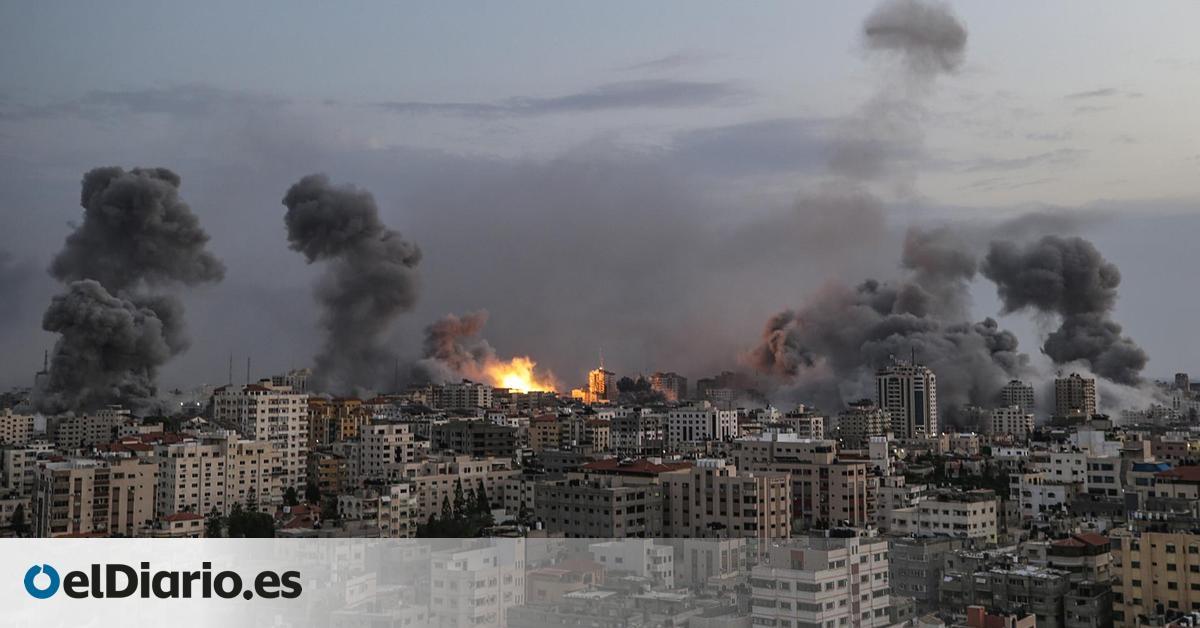
The Israeli Army has intensified its offensive against Gaza, after having regained control of its territory around the strip, into which hundreds of militants from the Palestinian group Hamas had infiltrated on Saturday, who continue to hold more than a hundred Israeli hostages, civil and military, as well as some foreigners. Bombings have hit the region from north to south.
“I have lifted all restrictions. “We are moving to a total offensive,” Defense Minister Yoav Gallant said this Tuesday. “Hamas wanted a change and will change 180 degrees from what they thought. They will regret that moment: Gaza will never be what it was.”
The town of Khan Younis in southern Gaza has been hit repeatedly. The Israeli Army has carried out one hundred attacks against that area, considered “a center of the Hamas terrorist organization, from where operations against Israel are launched,” it stated in a statement. From the Mediterranean Sea, off the coast of Khan Younis, the Israeli Navy has also attacked the town.
In the hospital morgue there is no longer room for the bodies, which lie on the floor with names written on their torsos, according to the Reuters news agency. The victims’ relatives have been asked to collect the bodies to free up space, because others will probably arrive. In the early hours of Wednesday, an airstrike against two homes in Khan Younis killed 16 people, members of two families, and injured dozens, according to the Palestinian news agency Wafa.
In the south, since Monday Israel has attacked the only exit from Gaza that it does not control, the Rafah border crossing with Egypt, up to three times, according to the Egyptian independent media Mada Masr. After two attacks today, the crossing has been closed indefinitely. Until now, only Palestinians with special permission could leave the strip for medical treatment. The Army has confirmed that it has carried out bombings in the Rafah area to “destroy a tunnel used to smuggle weapons and equipment into Gaza.”
In the north, the Rimal neighborhood in Gaza City has been reduced to rubble after hours of shelling, according to the AP agency. “I sell toys, not missiles. I want to leave Gaza, why do I have to stay here? I have lost my job and my house,” one of the neighbors denounced to the US agency. According to the Palestinian Wafa agency, the bombings have destroyed 22,639 homes.
For their part, the communities and towns near Gaza are still counting the victims of the Hamas assault, which has so far left 1,200 Israeli dead and 2,900 injured. Among those murdered and kidnapped there are minors. “Babies, mothers and fathers have been murdered by terrorists. This is not a war or a battlefield, it is a massacre,” Israeli general Itai Veruv told Reuters during a visit to the Kfar Aza kibbutz, one of the areas most affected by the Hamas attack.
On the Palestinian side, the death toll is 1,055 and 5,000 injured, after it increased considerably on Tuesday. The Gaza Ministry of Health has warned that it is not easy to collect data because the Internet connection is not stable in the strip. Not only have the bombings significantly damaged the infrastructure, but military planes and drones interrupt communications when they fly over the area.
Among the fatalities of the bombings are two senior Hamas officials: the Gaza Economy Minister, Yoad Abu Shmala, and the person in charge of foreign relations, Zacaría Abu Maamar. Both were members of the political office of Hamas, the main organ of the Islamist movement. The Israeli Army has stated that the group’s ministers and other civilian officials are also military targets and, in the case of Abu Shmala, “he managed the financing of terrorism inside and outside the Gaza Strip,” while Abu Maamar “took part in the decisions of the organization and the planning of numerous terrorist activities against the State of Israel.”
The EU has raised its tone against Israel after the blockade of Gaza. The high representative, Josep Borrell, first condemned “all attacks on civilians” and then admitted that the response of Benjamin Netanyahu’s government represents a violation of international law, in which the EU framed its right to self-defense. “Israel has the right to defend itself, but it has to be in accordance with international law and some decisions are contrary to international law.”
Israeli and foreign hostages
After ensuring control over their territory, the next objective of the Israeli troops is the rescue of about 100 people who were kidnapped by the militants in the towns and communities they entered over the weekend, and who are now in Gaza. , in the hands of Hamas and the Islamic Jihad group. The hostages are exposed to both Israeli bombing and Hamas threats.
The Islamist group has threatened to “publicly” execute Israeli citizens if its Army continues to carry out indiscriminate bombings on Gaza, without prior warning to residents. “Any attack on innocent homes in Gaza without prior warning and alert will be met with the public execution of a hostage,” Abu Obeida, spokesman for the Al Qasam brigades, the armed wing of Hamas, said in a statement on Monday.
“The enemy does not understand the language of humanity and morality, and we will address him in the language he knows. We hold the occupation responsible before the world for this decision, and the ball is in their court,” Obeida warned.
Residents of the strip have denounced that Israel has stopped using a method by which the Army warns that it is going to bomb, throwing non-explosive devices on the roofs of houses a few minutes before releasing the bombs, so that the population can leave. , often with just the right amount of time. Israel, for its part, says it has sent messages to Gaza residents to evacuate areas that are going to be bombed.
It is believed that among the hostages there are foreigners, in addition to fifty uniformed personnel, including officers, who will be the most valuable bargaining chip for the Palestinian militiamen – therefore, Obeida has assured that only civilians will be executed, not the military.
For example, the French Foreign Ministry, which has confirmed the death of four French citizens in Israel, has pointed out that some of the 13 missing Frenchmen “have probably been kidnapped.”
Yesterday, Israeli authorities found 30 people who were missing in Ein Hashlosha, very close to the Gaza border, according to the Israeli newspaper Haaretz. At the same time, they have confirmed that 50 soldiers are kidnapped and 123 have lost their lives. The Israeli Police, for its part, has reported that more than 40 of its troops have died.
Incessant bombings
Despite the presence of these hostages in Gaza, Israel has not stopped launching bombings and missiles on the strip, destroying entire blocks of the capital, Gaza, and other areas, such as the town of Khan Younis, in the south of the enclave. , where 2.3 million people live overcrowded.
The medical coordinator of Doctors Without Borders (MSF) in Gaza, Darwin Díaz, explains: “We moved our stock of emergency medical supplies for two months to Al-Awda hospital and we have used the stock that should last three weeks in just three days”.
Since Israel began bombing Gaza in response to the Hamas attack on Saturday, more than 263,000 people have been displaced, an increase of nearly 90,000 people in just 24 hours, according to the United Nations Humanitarian Aid Coordination Office (OCHA). United Nations, which expects the numbers to continue increasing.
Of those displaced, 170,000 have sought refuge in UNRWA schools, after having abandoned their homes for fear of being targeted by airstrikes. UNRWA in Spain assured this Wednesday that “it has been another hard night in Gaza.” “The civilian population feels the bombings close by and is totally terrified. “They can’t run away.” explained on the social network X (formerly Twitter).
Furthermore, he regretted that 30 of the students who attend those UNRWA schools in the strip have died: 17 girls and 13 boys, and another 8 have been injured.
30 of our UNRWA students, 17 girls and 13 boys, have died and another 8 have been injured.
We have no words.
Only sadness and pain. Much pain.
This has to stop IMMEDIATELY.📷 OCHA pic.twitter.com/C20JY3WLZF
— UNRWA.es (@UNRWAes) October 11, 2023
Both UNRWA and other humanitarian organizations have warned of the situation in Gaza, which is facing a serious shortage of supplies, electricity and water, after Israel ordered this Monday the total blockade of the strip, where all supplies are already in short supply. basic goods.
“There will be no electricity, food or fuel” coming from Israel, he assured yesterday Israeli Defense Minister Yoav Gallant. “I have given an order: Gaza will be under a total closure. “We are fighting against human animals and we act accordingly.”
The UN High Commissioner for Human Rights, Volker Türk, warned this Tuesday that the blockade could amount to “collective punishment” if it is not justified by “military needs.”
“This situation worsens an already serious humanitarian and human rights situation in Gaza and affects the ability of medical facilities to function, especially in the face of the increasing number of wounded,” Türk lamented. Likewise, he has expressed his displeasure over “the alleged summary executions of civilians and, in some cases, mass murders at the hands of members of Palestinian armed groups.”
For its part, the UN Children’s Fund (UNICEF), its executive director, Catherine Russell, has been “deeply concerned about the measures taken to block electricity and prevent food, fuel and water from entering Gaza, which that can put the lives of children at risk.”
“Given the rapidly deteriorating situation, humanitarian actors must be able to offer children and their families safe access to life-saving services and supplies, wherever they are,” he said in a statement. And she has reminded “all parties that in this war, as in all wars, it is the boys and girls who suffer first and who suffer the most.”
Source: www.eldiario.es

